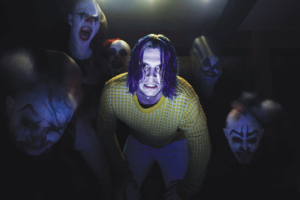 By Mia Thompson
By Mia Thompson
Through the years, the anthology series “American Horror Story” has used its format of changing stories and plotlines each season as an opportunity to explore many more supernatural themes than a typical show of its lifespan would be able to.
Past seasons have brought viewers face to face with entities such as ghosts, demons, witches and aliens. Season seven of “American Horror Story”, which premiered Tuesday, Sept. 5th, pivots away from this strategy. This year, program creators Ryan Murphy and Brad Falchuk have chosen to focus on the 2016 election; specifically, how people reacted to it and modified their behavior toward their friends, neighbors and strangers.
While the show’s ability to fairly address such a potent topic may have been called into question at first (particularly given the stereotype of Hollywood generally being quite liberal), two episodes into the season, “American Horror Story” is able to portray many points of view while having some fun at its characters’ expenses.
“American Horror Story” brings a little humor into a political climate fraught with tension. For example, one of the more liberal characters wonders aloud why the election results didn’t come with a trigger warning – a jab at the idea of our culture becoming too sensitized and overcompensating.
The show also manages to address the divides in the current political climate without directly pitting Trump and Clinton supporters against each other. The two 2016 candidates themselves have barely been seen so far, only in a flashback recap of real news coverage from the 2016 election season and election night returns.
“American Horror Story” also addresses the multiple conflicting motives within voters during the previous election. One of the show’s main characters, Ally, sees a resurgence of old phobias in the wake of Trump’s election (in a lighter moment, she is seen yelling, “What about Merrick Garland?” on election night); yet it arises later as a point of contention between her and her wife, Ivy, that despite her deep fears about Trump’s ideas, Ally voted in the swing state of Michigan for Jill Stein.
Another main character, Kai, is a Trump supporter solely because as an anarchist, he is delighted at the turmoil and fear that Trump’s election brings. Neither Kai nor Ally is a classic Democrat or Republican. In this way, the show avoids directing blame at either major political party and just focuses on unusual case studies in order not to alienate viewers.
The political elements of the show are expressed more in terms of fears and reactions than actual political debates or policy arguments. Election night 2016 is used as a jumping-off point to analyze people’s emotions and reactions, rather than rehashing the election itself.
Elements of racism, homophobia and xenophobia are touched on, and, of course, fear and frustration from characters on both ends of the political spectrum. Reactions are studied mostly on the interpersonal level, generally only using the candidates’ names to make a point or establish traits in the characters.
What the show ends up being is not a partisan affair, but rather a study in how we treat each other, express our emotions and how our fears can be exacerbated.


